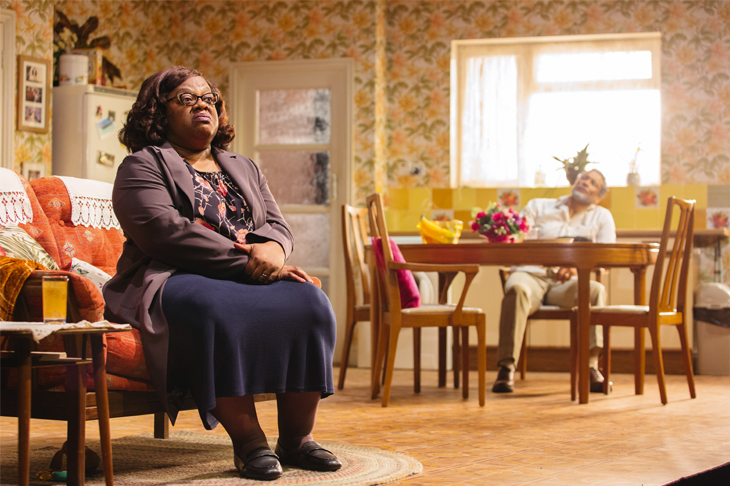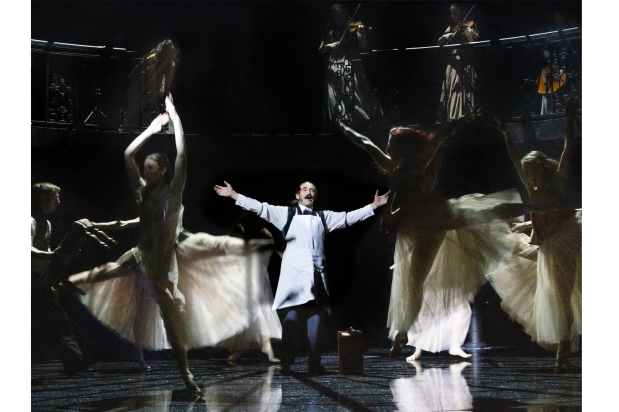Nine Night refers to a Jamaican custom that obliges bereaved families to party non-stop for more than a week following the death of a parent. When Gloria expires her relatives arrive from all parts of London and the Caribbean to indulge in a boozy blow-out. Gloria’s daughter Lorraine tussles with her businessman brother, Robert, who wants to stave off bankruptcy by flogging the family home immediately. Their half-sister, Trudy, arrives from Jamaica and collapses in hysterics over her abandonment by Gloria in infancy. Everyone lives in fear of Auntie Maggie, a pious matriarch, who uses a walking stick and whose religious devotion conceals the heart of an emotional despot. Cecilia Noble (Maggie) delivers a tour de force as the nit-picking hypochondriac. Her eccentric habits of expression make her interfering comments hilarious. When she hears about a nine-month-old baby being breast-fed, she says: ‘He mass be langin fra piece a chicken.’ Of her freedom pass she laments, ‘Only decent ting me gat from dis teeving gov’ment.’ And she worries that her dead sister’s bird’s-nest hairdo may ‘frighten Jee Suss!’
This simple and acutely observed family comedy is the first play by actress Natasha Gordon. Structurally it goes a bit wonky at the end. We don’t learn what happens to Robert’s failing business, to his pregnant wife, or to the disputed house sale. Instead we get a long and noisy exorcism sequence, which may be authentic but which lacks any tension because the departure of Gloria’s spirit from her home is never in doubt. Good things will flow from this flawed but often hilarious play. First, it deserves to tour. Second, Natasha Gordon will write more scripts. Finally, there should a spin-off show, ‘Auntie Maggie Holds Forth’, starring Cecilia Noble.
Mood Music is a bun fight about intellectual property. Aging pop star, Bernard, hires a young Irish blonde, Cat, to sing on his new album, which they take on a tour of America. One of their songs becomesa hit and they both claim authorship. Each of them hires a lawyer, and a therapist, and the two characters conduct lengthy and amusing conversations with their advisers.
It’s well acted, easy to watch, rarely dull, but a bit low-calorie. Playwright Joe Penhall wants to align himself with the woman’s cause and he emphasises his right-on credentials by making Bernard pose asa lip-service egalitarian. ‘I’m a feminist,’ he drawls, expecting a round of applause but receiving a tsunami of contemptuous laughter. Yet the script is masculine to its core. The male characters are shrewd, powerful, amusing and intelligent. The women are drips. Cat is a needy halfwit obsessed with her dead father, a failed drummer, and her mission in the play is to atone for her dad’s ineptitude by churning out hits with a male producer. In effect, she’s a puppet enacting the dreams of two older men. Her therapist (a one-note role played by Jemma Redgrave), meanwhile, is a bloodless nosy parker who cross-examines Cat in a quest to find evidence of sexual crimes that never occurred. With the copyright issue unresolved, Cat and Bernard are jointly given an Ivor Novello award. At the ceremony Cat meekly allows Bernard to snatch the microphone from her, mid-speech, and to use her stage time to boast about himself. This feels like a fantasy from the 1950s:a sexist tosser silencing a quiescent dollybird.
Ben Chaplin has a good time mooching around on stage as the dishevelled, mega-rich pop god. But his character comes under no emotional pressure and he’s too old and settled in his ways to learn or to change. He can’t even be bothered to make a pass at Cat so there’s no sexual tension between them. After the interval, he withdraws from the action and lounges in an armchair making witty swipes at his therapist.
The plot, meanwhile, wanders away from the copyright lawsuit and entangles itself in quibbles over misdemeanours allegedly committed during the tour of America. Several things happened to Cat. She was plied with booze, she was spirited across state lines, she was treated discourteously by male roadies, she was vaguely manhandled while inebriated, she was downgraded from first-class for being drunk on a plane. It’s unclear what crime, if any, was committed, by whom, or where. And the confusion is accidental rather than deliberate. This is understandable. Writers, when sketching out a play, like to keep several narrative options open for Act Two. But they ought to sweep away the unused threads from the final draft. Here the traces remain. And it’s puzzling that the second act crisis doesn’t implicate the main character, Bernard, who remains guiltless of any transgression.
This is a fun but undemanding show.I chuckled a lot and then forgot all about it. If you have a bunch of merchant bankers to entertain on a weekday evening, you’re sorted.
Got something to add? Join the discussion and comment below.
Get 10 issues for just $10
Subscribe to The Spectator Australia today for the next 10 magazine issues, plus full online access, for just $10.
You might disagree with half of it, but you’ll enjoy reading all of it. Try your first month for free, then just $2 a week for the remainder of your first year.














Comments
Don't miss out
Join the conversation with other Spectator Australia readers. Subscribe to leave a comment.
SUBSCRIBEAlready a subscriber? Log in